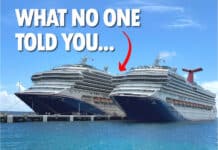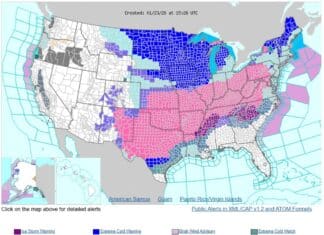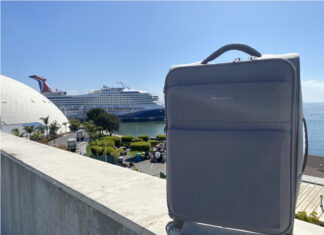Carnival Corporation ships could temporarily lose the right to dock at U.S. ports if a judge follows through on a threat made last week. If you’re wondering how Carnival got in this situation — and how it might impact passengers of the cruise line — read on…
What Got Carnival in Hot Water
Miami-based Carnival began a five-year probationary period in 2017 as part of a $40 million penalty for one of their Princess ships illegally dumping oily water into the ocean, and then falsifying official logs in an attempt to hide the incident.
Recent court filings, as reported by the Miami Herald, state the corporation has violated probation terms. Prosecutors allege that Carnival “sought to avoid unfavorable findings by preparing ships in advance of court-ordered audits, falsified records, dumped plastic garbage into the ocean and illegally discharged gray water into Glacier Bay National Park in Alaska.”
In addition to these probation violations, Carnival tried to lobby the U.S. Coast Guard through back channels to alter the terms of the settlement. Carnival has acknowledged these incidents according to news reports.

As a result, U.S. District Judge Patricia Seitz went so far as threatening to not allow Carnival to dock ships at U.S. ports. She will make her final decision in June about whether to impose a penalty on the corporation. Seitz described the 2017 $40 million settlement (the largest in ever for this sort of offense) as a “drop in the bucket” for a company like Carnival.
She stated that the company “prides itself on providing superb customer service. Well it is also a citizen of the world, it makes its money using the waterways and it has a responsibility to be a role model. Right now, it is a criminal defendant and this is not the first time nor is it the second time.”
The judge requested attendance at the June hearing by Carnival Chairman Micky Arison and President Arnold Donald, as well other executives. “The people at the top are treating this as a gnat,” Seitz said. “If I could, I would give all the members of the executive committee a visit to the detention center for a couple of days. It’s amazing how that helps people come to focus on reality.”
During last week’s hearing, Judge Seitz also mentioned her recent experience sailing aboard Carnival’s ultra-luxury cruise line Seabourn. Passengers heard a 45-minute presentation the damage plastic straws cause to the marine environment. Seitz stated in court, “Obviously they talk the talk, but they’re not walking the walk.”
Chief Communications Officer Roger Frizzell offered a statement after the hearing: “Our environmental responsibility has been and remains a top priority for the company. Our aspiration is to leave the places we touch even better than when we first arrived. This is in the best interest of our guests, our company and the oceans upon which we travel. We look forward to clarifying any issues and demonstrating our commitment.”
So What Could Happen if Carnival Ships Are Blocked from U.S. Ports?
Carnival Corporation owns more than 100 ships across nine cruise brands. Its lines, which either sail out of or visit U.S. ports include not only Carnival Cruises, but Holland America, Princess Cruises, Seabourn Cruise Line, and Cunard Line. Obviously, if the cruise line cannot dock at U.S. ports, depending on the duration of the injunction, thousands of cruise passengers, and potentially hundreds of cruise itineraries could be affected.
Effect on Passengers on Ships
First, there is the question of passengers on the ship. Since cruise ships sail continuously, they are almost always fully loaded with passengers. That means if the cruise line’s ships are barred from docking in the United States, there will be tens of thousands of passengers who can’t easily get back home.
Should that happen, we think the cruise line would look at ways to get people home from foreign ports. For example, disembarking passengers in Cozumel or Nassau and then paying to fly them home. (Even then, there is the issue of getting home passengers cruising with birth certificates instead of passports.) Obviously, this could be costly to the cruise line.
Passengers Setting Sail From U.S. Ports
And what about those cruises slated to embark in U.S. ports?
Carnival currently has a wider range of U.S. homeports than any other cruise line. Carnival ships depart from Baltimore, Charleston, Ft. Lauderdale, Galveston, Honolulu, Jacksonville, Los Angeles, Miami, Mobile, New Orleans, New York, Norfolk, Port Canaveral, San Diego, San Francisco, Seattle, and Tampa. Since easy geographic access to its ships has been one of the company’s selling points, losing access to U.S. ports would have a severe negative impact on Carnival.
What might the cruise line do? If prohibited from docking at U.S. ports, Carnival could opt to fly customers to the next nearest non-U.S. port on their itinerary. For example, New Orleans and Miami-based Western Caribbean cruises could sail out of Cozumel. Canada and New England cruises originally scheduled to depart from New York might begin in Halifax, possibly substituting Canadian ports for Boston and Portland.
But the truth is that would be extremely expensive — and difficult logistically — for the cruise line. As well, many of Carnival Cruises’ itineraries can’t easily be shifted to avoid U.S. ports. For example, voyages departing from Seattle might visit one or two Canadian ports, but are primarily oriented toward Alaskan tourism. Hawaiian cruises would be unable to dock at any of the ports included in their itineraries.
In addition to Carnival Corporation’s namesake brand, other cruise lines owned by the company will also be affected. Cunard, Holland America, Princess and Seabourn might have to cancel some U.S.-focused itineraries and find substitute ports outside the U.S. in order to salvage voyages.
Should Passengers Be Worried? What Should They Do?
Given the disruption the Carnival’s business, it’s likely the company will do whatever it takes to ensure they continue to sail from U.S. ports of call without interruption.
Still, the potential threat has many people worried.
Checking Carnival’s Twitter feed, the cruise line’s social media team was fielding comments and concerns by reiterating the company’s commitment to environmental concerns and assuring them there are no changes to schedules right now.
Our environmental responsibility has been and continues to be a top priority for our company. We intend to fully address the issues raised before the court that has received some attention. We want to assure you there are no changes to any cruise itineraries or schedules.
— Carnival Cruise Line (@CarnivalCruise) April 13, 2019
All that said, if you have an upcoming cruise with Carnival, it wouldn’t be a bad idea to get some cruise insurance to give you piece of mind.
CBS Baltimore asked AAA Mid-Atlantic what cruise passengers should do while waiting to see what the judge decides in June. The AAA representative recommended using a travel agent and getting trip insurance, noting that, “an agent can act as an intermediary and help if something goes wrong.”
Cruise Critic’s Carnival Cruise line forum echoed this advice. “If you do not usually purchase travel insurance and have a cruise booked, do so now and read the policy carefully or have it explained to you by their rep to ensure this would be covered in the unlikely event a solution is not reached.”
We agree that travel insurance may be your best protection if you’ve already booked a an upcoming cruise on any of the brands owned by Carnival for any time around June. Again, a disruption may not happen, but it never hurts to be better safe than sorry.
For more detail on cruise insurance, you can read our guide here.













I just love how Carnival says it is committed to the environment and it’s their top priority. Things are showing that that is not true but when it affects their bottom line then they try to make us all believe that they are a responsible company.
I hope the judge hits them hard. Don’t let them use USA soil for 4 months. These companies keep raising their fees and tell us if for our convenience.
I have a cruise coming up in July. If the cruise line can’t fulfill their obligation, then I expect to receive a full refund. Bottom line! I am NOT paying additional money for travel insurance. It would be their fault NOT mine!
I already have a cruise scheduled with Carnival Cruise non Nov. 9th to leave out of Jacksonville FL. would I just be able to cancel it? If the ships are banned?
You’d have to see. In our opinion, a banning is unlikely. Even if it did happen, it would likely be cleared up by November.